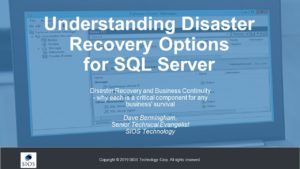Meet Australia’s smartest and highest tech stadium – Perth’s Optus Stadium
SIOS DataKeeper™ implemented with Microsoft Windows Server Failover Clustering for Hyper-V high availability
 SIOS DataKeeper was determined to be the only way to ensure a simple, manageable and yet cost-effective and robust solution that supported multiple integrations of devices and data securely, while also guaranteeing a high availability outcome.
SIOS DataKeeper was determined to be the only way to ensure a simple, manageable and yet cost-effective and robust solution that supported multiple integrations of devices and data securely, while also guaranteeing a high availability outcome.
The Perth Stadium, also known as Optus Stadium, is a high tech, multi-purpose stadium in Perth, Western Australia. Completed in late 2017 and officially opened in January 2018, the stadium has a capacity of over 60,000 people, making it the third-largest stadium in Australia after the Melbourne Cricket Ground and Stadium Australia. It has also been named Australia’s smartest and highest tech stadium.
According to Sascha Rhalf, Commercial Project Manager, Siemens, the Stadium is a landmark project in Western Australia that shapes the city’s skyline. It’s a high profile infrastructure development project that has been in the publics’ eye from the start due to the significant amount of government funding that the project has received.
The project itself has been a marvel, particularly for the Construction, Building Management and IT industries, given the complexity of both the building construction and IT architecture of the Stadium. Providence Solutions Australia along with Siemens and BGIS, joined forces to form a power-house team to work through the complex nature of the project and deliver one of Australia’s best Stadiums built to-date. Now nearing the end of its first year of operations, we discuss in more detail the background behind the project and the journey thus far.

The Challenge: Maintaining Availability
The highly customized-design of the Stadium made this a challenging project from the beginning. It was also a greenfield project, meaning there were no blueprints or previous examples/use cases to follow or reference. In fact, the blueprint for future similar projects was created during the project itself.
The project demanded a fit-for-purpose and tailored IT management solution that would meet all of the Stadium’s customized needs now, and into the future. The complexities of the IT design requirements ranged from high megapixel cameras, mission-critical application servers, a large number of multi-vendor integrations and dependencies, event day service delivery, and diverse vendors and ICT (Information Communications Technology) requirements. At the same time, it was important to keep to budget and timelines, as well as ensure the highest level of quality and security.
Complexity also stemmed from the fact that the very latest technologies were implemented to support the project’s future requirements. From face recognition to highly sophisticated access systems, to thousands of sensors – high tech and future-proofing technology was selected to ensure that the Stadium was equipped for the future. This meant, however, that the amount of data to be captured and stored on-site would be significant requiring a powerful solution to house and store the data securely.
The performance requirements for the technology implemented at the Stadium also gave complexity to the project. For example, the performance requirements for security video cameras alone was extraordinary. There are around 700 cameras including a significant number of ultra-high-definition cameras. The CCTV management solution is provisioned with 1Pb of scalable tiered storage for review, analytics, facial recognition and database matching.
There were also varied levels of availability requirements ranging from 99.999% (5 9’s) to 99.9% which is considered unique. It was critical to ensure that there was uninterrupted processing of data and application availability, eliminate any loss of data and transactions if a server fails, and continuous computing during repair.
The Solution for High Availability for Hyper-V Virtual Machines
Providence Solutions Australia was selected as an instrumental technology partner involved in the end-to-end solution design and build. From design to engineering, to building and implementing, they were the “brains” behind the Optus Stadium’s unified compute IT platform.
The Optus Stadium is the first-ever stadium in Australia to embrace a unified, continuous computing infrastructure platform which was highly essential given the complex nature of the project from both a building and IT perspective.
The unified continuous computing infrastructure platform is a single platform that can house multiple applications and data and features built-in resilience through fault tolerance, high availability, high performance and seamless disaster recovery capabilities. Put simply, it is a super platform – one that can cope with anything.
It was decided that a hyper-converged unified compute platform was key to the overall technology and IT build given the range of diverse systems and applications managed. Providence Solutions Australia implemented SIOS DataKeeper™ with Microsoft Windows Server Failover Clustering to provide high availability for their Hyper-V virtual machines. It was determined that this was the only way to ensure that there was a simple, manageable and yet cost-effective and robust solution that supported multiple integrations of devices and data securely, while also guaranteeing a high availability outcome.
The super platform and total building solution work by providing an end-to-end solution for the stadium operations. In a single platform, it contains a convergence of multiple systems, spanning video surveillance management, recording and archival, voice, data, storage, industrial monitoring (SCADA systems), HVAC, building and power management, security systems, video intercoms, irrigation, billboards, lifts, and lighting control.
There is a range of 3rd party vendor applications that sit on the integrated platform including Johnson Control, Philips Dynalite, and Schindler.
The Results
The Stadium has delivered. There has been positive feedback from the public and visitors since the opening. It is a state of the art stadium as well as a workplace with transparent and intelligent security on a future proof backbone with superior analytics.
It has been built with IT security top of mind and has been built meeting all the technical specifications and performance requirements set out by Multiplex. The IT architecture and design has also taken future developments into consideration.
Get a Free Trial of SIOS DataKeeper
Learn more about High Availability Clusters For Virtual Server Environments


